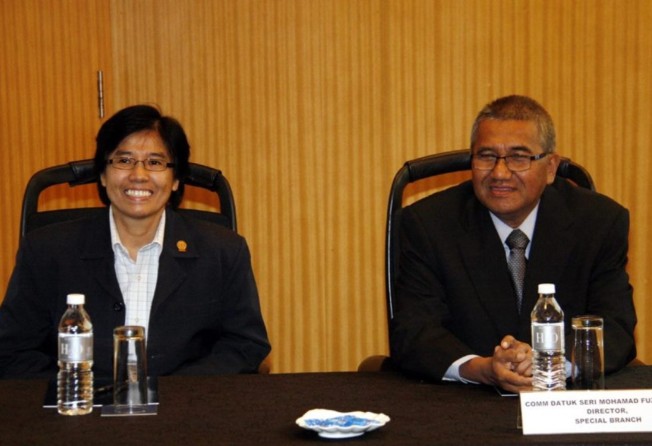
Indonesia needs more women in counterterrorism, like Malaysia’s Normah Ishak
- The two terror attacks in Indonesia this week point to an alarming trend: women are taking a leading role in extremist causes, and in some cases supplanting men as frontliners
- As Jakarta moves to invest in women to close the gender gap, it should show that they can be as influential as men in the fields of intelligence and security

Indonesia’s two terror attacks this week resulted in limited casualties, but they point to an increasingly alarming trend.
While women have always been crucial to terrorist networks, mostly behind the scenes, they are taking a leading role in extremist causes and in some cases supplanting men as terror masterminds’ frontliners of choice.
After a recently married couple – the woman being four months pregnant – unleashed a pressure-cooker bomb at a cathedral in Makassar on Palm Sunday, killing themselves and injuring at least 20 others, three women were among those arrested for possible links to the perpetrators. On Thursday, a 25-year-old female university dropout went to the national police headquarters in Jakarta and fired at officers. She was shot dead.
In a report published last September, the Institute for Policy Analysis of Conflict (IPAC) think tank pointed to the growing number of female extremists in Indonesia. While only four women had been imprisoned on terrorism charges before the declaration of Islamic State (Isis) in June 2014, by last September there were 39 women awaiting trial or serving sentences for terrorism in the country.
What changed? Experts who have studied Indonesian terrorist networks say women have always been crucial to their resilience. Among other things, they raised funds to conduct attacks, evaded surveillance to pass messages, and were part of marriages that solidified ties between groups with jihadist leanings.
Jemaah Islamiah (JI), the al-Qaeda network’s Southeast Asian offshoot – which carried out some of Indonesia’s deadliest attacks, including the 2002 Bali bombings that killed 202 people – did not use women as combatants. But as more women radicalised by Isis ideology to seek martyrdom began carrying out attacks, and the phenomenon was amplified on social media, gender norms were overturned.
As researcher Lydia Khalil put it in a June 2019 analysis for the Lowy Institute, Isis had expanded the potential and scope of female involvement and the fall of the Isis caliphate had not dampened the appeal of jihad. “As Isis shifts from governance project to global terrorist movement, women will continue to play an important part of that transformation,” she said.

The Indonesian government clearly recognises this problem. It has devoted resources to increasing surveillance of known networks – well aware that in spite of waning support for Isis, the threat that highly mobile extremists will “regroup, recruit and regenerate with the aim of conducting jihad”, to quote IPAC, is real.
Jakarta is also conducting ongoing research into understanding the factors causing extremism and recidivism. Yet some of its assumptions come across as outdated.
In February, the national agency for combating terrorism, known as BNPT, released research done over a decade that showed women were marginally more likely than men to be radicalised, with them getting such content on the internet. In a webinar last June, a BNPT official said women were used by terrorist networks because they were “loyal and obedient” and given their lower literacy levels, were more easily influenced by their surroundings.
These views, carried by online media sites, do little to further the public’s and policymakers’ understanding of the changing role that women are playing in extremist networks.
As Southeast Asia’s largest economy pledges to invest in educating women to close the gender gap, it should focus on how to empower women in counterterrorism efforts.
Experts have proposed different measures, for example IPAC’s suggestion to allow female prison officers to shape and spearhead rehabilitation programmes for female inmates, and increase their salaries if they succeed.
Beyond recruiting more women into Indonesia’s defence and security services and profiling their contributions to upholding its values of unity in diversity, Indonesia will also need to get women to front the discussion about the dangers of radicalisation. Why not organise an international conference led by female experts on this topic?
Malaysia did well last year by appointing its first female counterterrorism chief, Normah Ishak, demonstrating to a conservative society that in the traditionally male-dominated fields of intelligence and security, women can play an equally influential role.